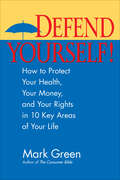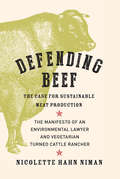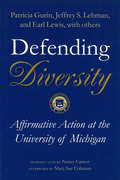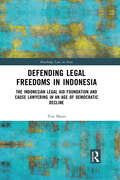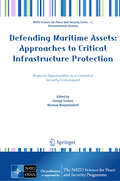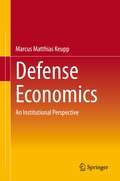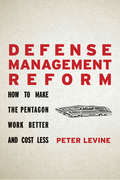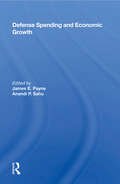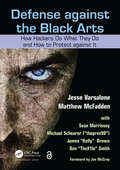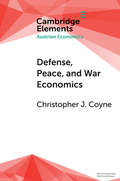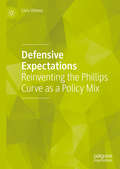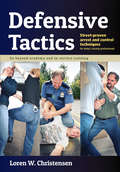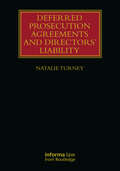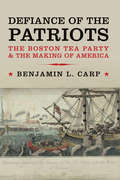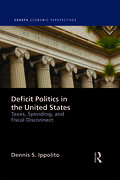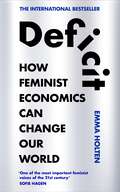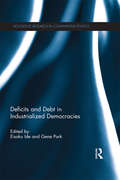- Table View
- List View
Defend Yourself!: How to Protect Your Health, Your Money, And Your Rights in 10 Key Areas of Your Life
by Mark J. GreenTalk Back / Fight BackPatient, client, employee, small business owner, taxpayer, investor, consumer—it's time to defend yourself! Why should anyone tolerate an HMO not paying for his emergency surgery because he didn't give notice beforehand or accept a higher auto insurance rate because she lives in a low-income community? A large body of laws and regulations exists to give average workers and consumers the tools to talk back and fight back.
Defending Beef: The Case for Sustainable Meat Production
by Nicolette Hahn NimanFor decades it has been nearly universal dogma among environmentalists and health advocates that cattle and beef are public enemy number one. But is the matter really so clear cut? Hardly, argues environmental lawyer turned rancher Nicolette Hahn Niman in her new book, Defending Beef. The public has long been led to believe that livestock, especially cattle, erode soils, pollute air and water, damage riparian areas, and decimate wildlife populations. In Defending Beef, Hahn Niman argues that cattle are not inherently bad for either the Earth or our own nutritional health. In fact, properly managed livestock play an essential role in maintaining grassland ecosystems by functioning as surrogates for herds of wild ruminants that once covered the globe. Hahn Niman argues that dispersed, grass-fed, small-scale farms can and should become the basis for American food production, replacing the factory farms that harm animals and the environment. The author--a longtime vegetarian--goes on to dispel popular myths about how eating beef is bad for our bodies. She methodically evaluates health claims made against beef, demonstrating that such claims have proven false. She shows how foods from cattle--milk and meat, particularly when raised entirely on grass--are healthful, extremely nutritious, and an irreplaceable part of the world's food system. Grounded in empirical scientific data and with living examples from around the world, Defending Beef builds a comprehensive argument that cattle can help to build carbon-sequestering soils to mitigate climate change, enhance biodiversity, help prevent desertification, and provide invaluable nutrition. Defending Beef is simultaneously a book about big ideas and the author's own personal tale--she starts out as a skeptical vegetarian and eventually becomes an enthusiastic participant in environmentally sustainable ranching. While no single book can definitively answer the thorny question of how to feed the Earth's growing population, Defending Beef makes the case that, whatever the world's future food system looks like, cattle and beef can and must be part of the solution.
Defending Diversity
by Patricia Gurin Jeffrey S. Lehman Earl LewisEven as lawsuits challenging its admissions policies made their way through the courts, the University of Michigan carried the torch for affirmative action in higher education. In June 2003, the Supreme Court vindicated UM's position on affirmative action when it ruled that race may be used as a factor for universities in their admissions programs, thus confirming what the UM had argued all along: diversity in the classroom translates to a beneficial and wide-ranging social value. With the green light given to the law school's admissions policies, Defending Diversity validates the positive benefits gained by students in a diverse educational setting. Written by prominent University of Michigan faculty, Defending Diversity is a timely response to the court's ruling. Providing factual background, historical setting, and the psychosocial implications of affirmative action, the book illuminates the many benefits of a diverse higher educational setting -- including preparing students to be full participants in a pluralistic democracy -- and demonstrates why affirmative action is necessary to achieve that diversity. Defending Diversity is a significant contribution to the ongoing discussion on affirmative action in higher education. Perhaps more important, it is a valuable record of the history, events, arguments, and issues surrounding the original lawsuits and the Supreme Court's subsequent ruling, and helps reclaim the debate from those forces opposed to affirmative action.
Defending Legal Freedoms in Indonesia: The Indonesian Legal Aid Foundation and Cause Lawyering in an Age of Democratic Decline (Routledge Law in Asia)
by Tim MannDefending Legal Freedoms in Indonesia provides fresh insights into how cause lawyers navigate political and institutional change, by presenting and analysing the Indonesian Legal Aid Foundation (YLBHI), the oldest and most influential legal and human rights organisation in Indonesia.Based on rich ethnographic research, this book charts the developments of the organisation since its founding in 1970, its contribution to the ending of the authoritarian, military-backed New Order (1966-1998), its relative decline in the years following Indonesia’s democratisation and its revival in recent years as Indonesian democracy and human rights come under threat. The author examines the tactics the organisation has used, including show trials and working alongside grassroots communities, organising them and educating them about their rights. It highlights how this organisation flourished more under an authoritarian regime than under democracy and how its present, prominent, adversarial-political version of cause lawyering is playing a leading role in civil society resisting further erosion of democracy and human rights. The book addresses recent democratic erosion under President Joko Widodo, and documents pivotal moments in Indonesia’s contemporary history, such as the ‘Reform Corrupted’ mass demonstrations in 2019, illuminating how democracy shrinks, and how lawyers push back.The first book on Indonesia’s crucially important cause lawyering, activist lawyers’ group, this book will be of interest to researchers in Asian Law, Indonesian Studies. It is also an essential point of reference for future research in public lawyering in Asia.
Defending Maritime Assets: Approaches to Critical Infrastructure Protection (NATO Science for Peace and Security Series C: Environmental Security)
by George Scutaru Murman MargvelashviliThe conflict in Ukraine has thrust the Black Sea into the center of the largest European dispute since 1945, leading to significant consequences for both the Alliance and the countries neighboring the Black Sea. The Kremlin's strategic use of energy resources has disrupted the flow of hydrocarbons, which remained untouched even during the tensest moments of the Cold War. Simultaneously, the potential for offshore energy sources in the Black Sea presents an opportunity for the region to achieve greater energy independence. This could be realized in the short term through oil and gas, as well as in the long term through the development of renewable energy sources. These prospects coincide with a volatile security environment in the Black Sea region. While military actions have escalated in the Northern Black Sea, countries along the coast such as Georgia and Romania have been confronted with Russian New Generation Warfare tactics since the annexation of Crimea in 2014. Since 2017, Russian military exercises have effectively blocked access to the Black Sea, employing legal strategies as part of their approach. This has led to a blurring of the lines between traditional notions of hot and cold wars. The Gerasimov doctrine and incidents like the Nord Stream sabotage have underscored the fact that critical energy infrastructure is no longer off-limits, and the unique characteristics of maritime infrastructure have turned it into a new arena in the realm of hybrid warfare
Defending The Undefendable: The Pimp, Prostitute, Scab, Slumlord, Libeler, Moneylender, and Other Scapegoats in the Rogue's Gallery of American Society
by Walter BlockProfessor Block's book is in a new edition from the Mises Institute, completely reset and beautifully laid out in an edition worthy of its contents. <P><P>It is among the most famous of the great defenses of victimless crimes and controversial economic practices, from profiteering and gouging to bribery and blackmail. However, beneath the surface, this book is also an outstanding work of microeconomic theory that explains the workings of economic forces in everyday events and affairs. <P><P>Murray Rothbard explains why: "Defending the Undefendable performs the service of highlighting, the fullest and starkest terms, the essential nature of the productive services performed by all people in the free market. By taking the most extreme examples and showing how the Smithian principles work even in these cases, the book does far more to demonstrate the workability and morality of the free market than a dozen sober tomes on more respectable industries and activities. <P><P> By testing and proving the extreme cases, he all the more illustrates and vindicates the theory." F.A. Hayek agreed, writing the author as follows: "Looking through Defending the Undefendable made me feel that I was once more exposed to the shock therapy by which, more than fifty years ago, the late Ludwig von Mises converted me to a consistent free market position. ...
Defending the National Interest: Raw Materials Investments and U.S. Foreign Policy (Center for International Affairs, Harvard University #1)
by Stephen D. KrasnerStephen Krasner's assumption of a distinction between state and society is the root of his argument for the superiority of a statist interpretation of American foreign policy. Here he challenges the two dominant and rival interpretations of the relationship between state and society: interest group liberalism and Marxism. He contends that the state is an autonomous entity acting on behalf of the national interest, and that state behavior cannot be explained by group or class interest.On the basis of fifteen case studies drawn from extensive public records and published literature on American raw materials policy in the twentieth-century, Professor Krasner provides empirical substance to the debate about the meaning of the "national interest," the importance of bureaucratic politics, and the influence of business on American foreign policy.
Defense Economics: An Institutional Perspective
by Marcus Matthias KeuppThis textbook examines the economic problems of military organizations from an institutional perspective. It discusses the efficiency and effectiveness of military performance, using a capability-based conceptualization. Constitutional, historical and economic considerations complement the analysis. Neither the analysis nor the conclusions depend on any specific armed force, culture, organization, or language. On the contrary, the challenge of defense economics analysis and armed forces management is reduced to a fundamental economic problem, and solutions to this problem are offered. This book is a must-read for students, scholars and practitioners interested in a better understanding of defense economics.
Defense Logistics Agency: Dynamic Vaccine Distribution at Scale
by Gary P. Pisano Michael Norris Hise Gibson Pettis KentCase
Defense Management Reform: How to Make the Pentagon Work Better and Cost Less
by Peter LevinePentagon spending has been the target of decades of criticism and reform efforts. Billions of dollars are spent on weapons programs that are later abandoned. State-of-the-art data centers are underutilized and overstaffed. New business systems are built at great expense but fail to meet the needs of their users. Every Secretary of Defense for the last five Administrations has made it a priority to address perceived bloat and inefficiency by making management reform a major priority. The congressional defense committees have been just as active, enacting hundreds of legislative provisions. Yet few of these initiatives produce significant results, and the Pentagon appears to go on, as wasteful as ever. In this book, Peter Levine addresses why, despite a long history of attempted reform, the Pentagon continues to struggle to reduce waste and inefficiency. The heart of Defense Management Reform is three case studies covering civilian personnel, acquisitions, and financial management. Narrated with the insight of an insider, the result is a clear understanding of what went wrong in the past and a set of concrete guidelines to plot a better future.
Defense Spending And Economic Growth
by James E. Payne Anandi P. SahuThis book examines the impact defense spending has on economic growth. While defense spending was not deliberately invented as a fiscal policy instrument, its importance in the composition of overall government spending and thus in determining employment is now easily recognized. In light of the collapse of the Soviet Union and the consequent reduction in the threat to the security of the United States, maintaining defense spending at the old level seems indefensible. The media has concentrated on the so-called peace dividend. However, as soon as the federal government is faced with defense cuts, it realizes the macroeconomic ramifications of such a step. Based on studies included in this volume, we examine the effects of defense spending on economic growth and investigate how the changed world political climate is likely to alter the importance and pattern of defense spending both for developed and developing countries.
Defense against the Black Arts: How Hackers Do What They Do and How to Protect against It
by Jesse Varsalone Matthew McFaddenExposing hacker methodology with concrete examples, this volume shows readers how to outwit computer predators. With screenshots and step by step instructions, the book discusses how to get into a Windows operating system without a username or password and how to hide an IP address to avoid detection. It explains how to find virtually anything on the Internet and explores techniques that hackers can use to exploit physical access, network access, and wireless vectors. The book profiles a variety of attack tools and examines how Facebook and other sites can be used to conduct social networking attacks.
Defense, Peace, and War Economics (Elements in Austrian Economics)
by Christopher J. CoyneThis Element surveys the field of defense, peace, and war economics with particular emphasis on the contributions made by Austrian economists. I first review treatments of defense, peace, and war by the classical economists. I then discuss the rise of a distinct and systematic defense, peace, and war economics field of study starting in the 1960s. Next, I consider the contributions by Austrian economists to the field. This includes the economic analysis of the nature of the war economy, problems with the public good justification for the state-provision of defense, the seen and unseen costs of war, the idea of the liberal peace, and the realities and limitations of foreign intervention. I conclude with a discussion of some open areas for future research.
Defensive Expectations: Reinventing the Phillips Curve as a Policy Mix
by Liviu VoineaThis book explains why inflation remains subdued after recessions, based on three revolutionary concepts: defensive expectations, compensatory savings, and cumulative wage gap. When income falls, consumption falls, and savings rise, as people rebuild their past wealth. Households will not spend more until they fully recover what they lost. The revised Phillips Curve explains that current inflation depends on the cumulative difference between current income and past income.This new theory is tested and validated by data for US since 1960 to date and for 35 OECD countries from 1990 to date. A number of policy implications are derived from these results. The book calls for an optimal policy mix between monetary policy and fiscal policy; it also discusses the coronavirus crisis as an extreme case of defensive expectations.
Defensive Internationalism: Providing Public Goods in an Uncertain World
by Mark A. Boyer Davis B. BobrowIn this pathbreaking study, authors Davis B. Bobrow and Mark A. Boyer argue for "muted optimism" about the future of international cooperation. Leaders of a growing movement that integrates constructivism into traditional international studies concepts and methods, Bobrow and Boyer analyze four key international issues: development cooperation, debt management, peacekeeping operations, and environmental affairs. Their approach integrates elements of public goods theory, identity theory, new institutionalism, and rational choice. Defensive Internationalism is a well-written, creative and coherent synthesis of ideas that have up to now been considered irreconcilable. It is appropriate for upper-level undergraduate and graduate students in international relations, conflict studies, and political economy, and promises to become a foundational work in its field.
Defensive Tactics: Street-Proven Arrest and Control Techniques
by Loren W. ChristensenDefensive Tactics: Street Proven Arrest and Control Techniques Whether you are a law enforcement officer seeking to improve your edge or a martial artist wanting to expand your knowledge of street-proven techniques, you will find Defensive Tactics: Street-Proven Arrest and Control Techniques is filled with invaluable information to prepare you for even the most difficult scenarios.Highlights include* Joint manipulation that works* Leverage control vs. pain control* Striking with the hands, feet, forearms, and elbows* Safely and quickly crossing the gap* Blocking an assailant's strikes* Using vulnerable points to gain compliance* Head disorientation* Safe application of carotid constriction or "sleeper" holds* Controlling a suspect on the ground* Arresting big guys* Fighting concepts to take on patrol* Weapon retention in close quarters and on the ground Loren W. Christensen is a retired cop and high-ranking martial artist who survived everything the mean streets threw at him, working patrol, gang enforcement, and dignitary protection. Defensive Tactics goes beyond what is taught in the academy, during an officer's in-service training, and what is allowed by the administration.This book also includes a chapter on proven ways to control a suspect on the ground, written by LAPD officer Mark Mireles, an MMA coach, police academy trainer, and champion wrestler.
Deferred Prosecution Agreements and Directors’ Liability (ISSN)
by Natalie TurneyThis book provides in-depth analysis of deferred prosecution agreements (DPAs), a tool first introduced in the United States and since implemented in the United Kingdom and other jurisdictions. The central focus of the book is the impact of DPAs on company directors: DPAs were first introduced in the US for individuals, but are now used predominantly for corporate defendants. In the UK, DPAs have only ever been available for companies.The consideration of individuals in the introductory stage in the UK is explored in depth, as well as the consideration and targeting of individuals in cases that have followed. Company directors are exposed to liability because of this negotiated deal between the company and prosecutors, and this book addresses the key areas of exposure, and how various parties should address these risk areas in accordance with the law. The book is an increasingly necessary contribution to the topical discussion of the fallout of unsuccessful prosecutions of individuals implicated in the wrongdoing constituting the basis of DPAs, calling into question not only treatment of those individuals but also the integrity of the DPA tool itself. It also considers the impact of DPAs and arising exposures on directors’ and officers’ (D&O) liability insurance, therefore covering potential risk areas and the ability of directors to access a defence in protecting themselves from liability. The book covers the impact on all areas of a D&O policy, considering D&O policy wording and insurance law in doing so, providing a rounded account of issues arising in relation to company directors and how interested parties can act in the best interests of all whilst in accordance with law and policy.The primary audience for this book will be lawyers and practitioners in the corporate crime and/or insurance law space, including general counsels, solicitors, barristers, consultants, prosecuting authorities, legal academics, and so forth. It will also be of interest to company directors, and to students of financial crime, corporate criminal crime and insurance law, and will have great international appeal. Organisations likely to use the book will include prosecuting authorities, law firms working on corporate criminal liability or D&O insurance cases, and companies looking to protect themselves where there is alleged wrongdoing.
Deferred Taxes and the Valuation Allowance at Lucent Technologies, Inc. (A)
by Jacob Cohen Gregory S. MillerThe concept of deferred tax accounting is introduced, along with examples to demonstrate the balance sheet perspective of FAS #109.
Deferred Taxes and the Valuation Allowance at Lucent Technologies, Inc. (B)
by Jacob Cohen Gregory S. MillerSupplements the (A) case.
Deferred Taxes at Obadiah Vineyard
by Romana L. AutreyObadiah Vineyard's owners create financial statements in accordance with generally accepted accounting principles (GAAP) to help them obtain funding to plant more acreage. The owners grapple with deferred taxes and the differences between tax and financial reporting books.
Defiance of the Patriots
by Benjamin L. CarpOn the evening of December 16, 1773, a group of disguised Bostonians boarded three merchant ships and dumped more than forty-six tons of tea into Boston Harbor. The Boston Tea Party, as it later came to be known, was an audacious and revolutionary act. It set the stage for war and cemented certain values in the American psyche that many still cherish today. But why did the Tea Party happen? Whom did it involve? What did it mean? The answers to these questions are far from straightforward. In this thrilling new book, Benjamin L. Carp tells the full story of the Tea Party--exploding myths, exploring the unique city life of Boston, and setting this extraordinary event in a global context for the first time. Bringing vividly to life the diverse array of people and places that the Tea Party brought together--from Chinese tea-pickers to English businessmen, Native American tribes, sugar plantation slaves, and Boston's ladies of leisure--Carp illuminates how a determined group shook the foundations of a mighty empire, and what this has meant for Americans since. As he reveals many little-known historical facts and considers the Tea Party's uncertain legacy, he presents a compelling and expansive history of an iconic event in America's tempestuous past.
Defiant Braceros: How Migrant Workers Fought for Racial, Sexual, and Political Freedom (The david J. Weber Series In The New Borderlands History Ser.)
by Mireya LozaIn this book, the author sheds new light on the private lives of migrant men who participated in the Bracero Program (1942-1964), a binational agreement between the United States and Mexico that allowed hundreds of thousands of Mexican workers to enter this country on temporary work permits. While this program and the issue of temporary workers have long been politicized on both sides of the border, the author argues that the prevailing romanticized image of braceros as a family-oriented, productive, legal workforce has obscured the real, diverse experiences of the workers themselves. Focusing on underexplored aspects of workers' lives--such as their transnational union-organizing efforts, the sexual economies of both hetero and queer workers, and the ethno-racial boundaries among Mexican indigenous braceros--author reveals how these men defied perceived political, sexual, and racial norms. Basing her work on an archive of more than 800 oral histories from the United States and Mexico, the author is the first scholar to carefully differentiate between the experiences of mestizo guest workers and the many Mixtec, Zapotec, Purhepecha, and Mayan laborers. In doing so, she captures the myriad ways these defiant workers responded to the intense discrimination and exploitation of an unjust system that still persists today.
Deficit Politics in the United States: Taxes, Spending and Fiscal Disconnect (Europa Economic Perspectives)
by Dennis S IppolitoFrom the clashes between Federalists and Republicans in the 1790s until today, partisan battles over taxing, spending, and public debt have shaped American political development. These battles were formerly constrained by fiscal norms that mandated balanced budgets and low debt. In his Farewell Address, President George Washington counseled the nation to "cherish public credit" by using "it as sparingly as possible". In the 1980s, however, tax cuts and spending increases created large structural deficits and much higher debt levels. With only a brief interruption in the late 1990s, deficit politics has been a mainstay ever since. Over this period, the Republican Party has passed large tax cuts but failed to retrench the large entitlement programs that continue to raise spending. Likewise, the Democratic Party has expanded the domestic role of government but has abandoned the broad-based taxation it supported in the 1990s. Funding their domestic agenda with matching revenues is now as unappealing for Democrats as entitlement cutbacks are for Republicans, contributing to the current stalemate of Republican tax policy, Democratic spending policy, and soaring deficits and debt. The economic risks this entails are serious, yet an end to the era of deficit politics is nowhere in sight.
Deficit: How Feminist Economics Can Change Our World
by Emma Holten*AN INTERNATIONAL BESTSELLER*WINNER OF THE POLITIKEN LITERATURE PRIZE 2024'Brilliantly rewrites the history of economic thought to place 'her story' at its heart. A must-read' - Kate Raworth, author of DOUGHNUT ECONOMICS'One of the most important feminist voices of the 21st century . . . The book about capitalism we didn't know we needed' - Sofie HagenIn 2020, the prominent Danish feminist Emma Holten read an article stating that women were a net ‘deficit’ to society. Women took more than they gave, ‘draining’ the public purse by giving birth and taking parental leave. They contributed less than their fair share in taxes, because they often worked part-time to look after other people at home, or held low-paidjobs in the public sector. Denmark would be richer if women’s lives looked more like men’s, the economic experts concluded. A similar story is told around the globe.How did we get here? In Deficit, Emma Holten traces how economic thinkers – from the Enlightenment onwards – created a value framework that overlooked and neglected ‘women’s work’ and acts of care. She reveals how the economic models that drive political decisions today are just as flawed, giving us unparalleled monetary wealth, but causing deep social harms that are hurting us all.If we cannot properly value the things that matter, how can we build a better future?
Deficits and Debt in Industrialized Democracies (Routledge Research in Comparative Politics)
by Gene Park Eisaku IdeSince the global financial crisis, government debt has soared globally by 40 percent and now exceeds an astonishing $100 trillion. Not all countries, though, have fared the same. Indeed, even prior to the financial crisis, the fiscal fates of countries have been diverging, despite predictions that pressures from economic globalization push countries toward more convergent fiscally conservative policies. Featuring the work of an international interdisciplinary team of scholars, this volume explains patterns of fiscal performance (persistent patterns of budget deficits and government debt) from the 1970s to the present across seven countries – France, Italy, Germany, Japan, South Korea, Sweden, and the United States. Employing a comparative case study approach, seldom employed in studies of fiscal performance, contributions illuminate the complex causal factors often overlooked by quantitative studies and advances our theoretical understanding of fiscal performance. Among other things, the cases highlight the role of taxpayer consent, tax structure, the welfare state, organization of interests, and labor and financial markets in shaping fiscal outcomes. A necessary resource to understand a broader array of factors that shape fiscal outcomes in specific national contexts, this book will reinvigorate the study of fiscal performance.
